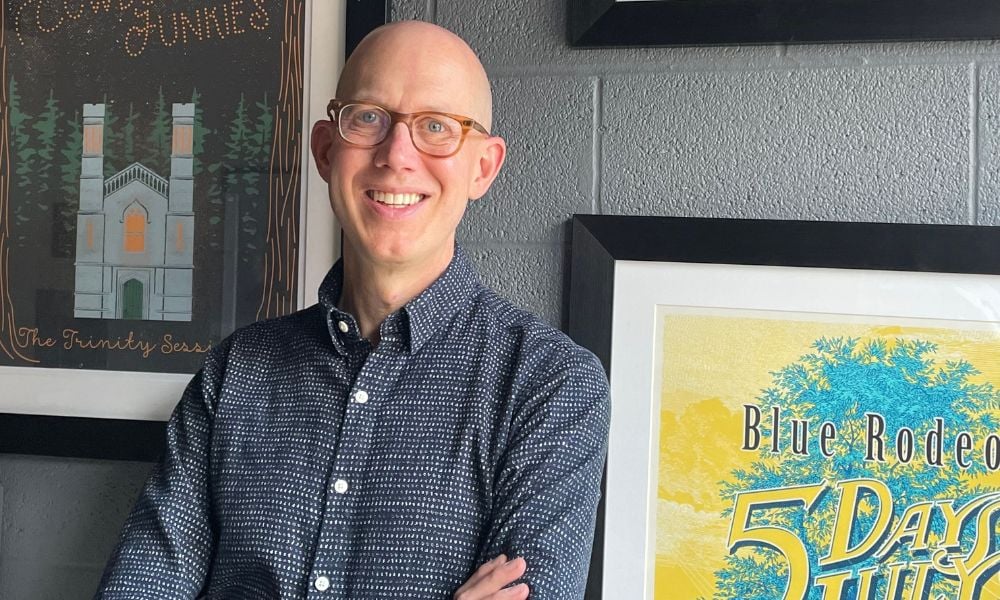
He's witnessed an immense amount of change in the creative sector driven by technology

How do you categorically prove intellectual property infringement in the creative sector? For Richard Pfohl, General Counsel at Music Canada, it’s an ever-pressing concern. Coming from the tech sector to the music world, however, gave him a learned ability to adapt and evolve – something that’s become a core skill.
“At McCarthy Tétrault I was a technology lawyer in their technology, communications and IP group,” he says. “One day, I got a call from Music Canada’s predecessor association saying, ‘Hi, we’re the music industry, and we could really use a tech lawyer on staff right now.’ And they were right.”
Pfohl has worked at Music Canada since 2003, and in that time, he’s witnessed an immense amount of change. Technology really drives the music industry, says Pfohl, especially with the move to digital. An increasing reliance on technology, coupled with the rise of AI in content creation, means Pfohl’s role at Music Canada is a critical one.
“During my time at Music Canada, the way our industry operates has fundamentally evolved,” he says. “We used to primarily be about selling physical objects. Then, it was selling digital downloads. And now we’ve evolved again to commercial streaming services – that's where the bulk of industry revenue comes from today.”

Now, as with almost every other sector out there, the age of AI has dawned. In the legal space, AI poses both great opportunities and challenges. A recent report from Info-Tech Research Group, based in London, Ontario, found that of those looking to invest in AI, 66 percent of companies believe the tech will positively impact their organization in 2024, with 47 percent keen to adopt generative AI specifically.
However, for in-house legal teams, concerns remain around compliance.
"The most recent challenge for us is, of course, artificial intelligence,” says Pfohl. “It's been a tool that [music] companies have been using for years now in various ways to help make the music that they make. Now what we're seeing is potentially even more fundamental transformative challenges from AI that may upend the way that our industry works.”
That is especially true where the legalities around IP and plagiarism are concerned. In October of 2023, a cohort of music publishers sued AI company Anthropic for allegedly using copyrighted song lyrics to train its chatbot. The lawsuit included songs from Beyoncé, Bruno Mars and the Beach Boys, according to reports – with the case said to be the first of its kind.
"AI can ingest the entire Beatles catalogue, for example, and then come out with music in the style of The Beatles,” adds Pfohl. “When people first started doing this a couple of years ago, they were pretty bad. You couldn't really listen to them – but they’re getting better by the month. This creates a fundamental challenge in which everything that artists have put into creating their sound can be captured and used to create new works that fundamentally rip [them] off.”
This advancement raises significant questions about copyright law and its ability to protect the unique creations of artists in the face of such technological capabilities. In a typical copyright trial in the music industry, a jury would debate whether one song was too similar to another. This issue becomes massively compounded by generative AI – especially if there’s no direct, note for note, copy.
“Now, [someone] could be creating something [with AI] based upon a back catalogue,” says Pfohl. “You may not necessarily be able to trace back to particular elements of a song – however they’re fundamentally based off the previous creations of another artist. That’s the real challenge we’re facing right now.”
It’s these key considerations that Pfohl teaches his students to carefully consider. As an educator, he’s keen to impress the importance of digital law and it’s ever-evolving nature.
"The beauty of practising in my field is that the law is always changing,” he says. “That keeps it interesting for me – it also keeps it interesting to teach. Sometimes, you're not going to have a proper fit. For example, the first sale doctrine in copyright was designed for physical objects. It doesn't work in the digital realm.”
Discussing international copyright enforcement, Pfohl highlights the global nature of these challenges and the collaborative efforts to address them.
"I see jurisdictions around the world struggling with similar challenges and shared challenges," he says. He points out how countries have come together to update and adapt copyright laws to the digital and AI landscapes, citing examples such as the World Intellectual Property Organization's treaties and various national legislation.
Looking ahead, however, Pfohl’s both cautious and optimistic.
"It's a matter of separating wheat from chaff,” he says. “About three years ago, all of the online legal seminars were looking at bitcoin and blockchain. The question was, does this fundamentally disrupt things? My take at the time was no, it doesn't. It's another vehicle that can be used. When the digitization of our economy came along, that fundamentally changed things. And I do believe that AI has the potential to be similarly disruptive.”